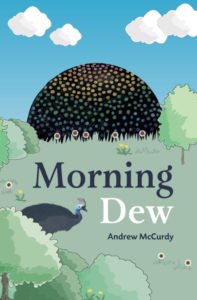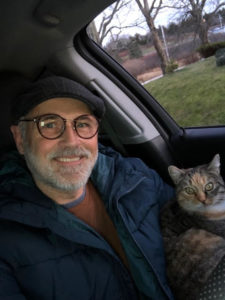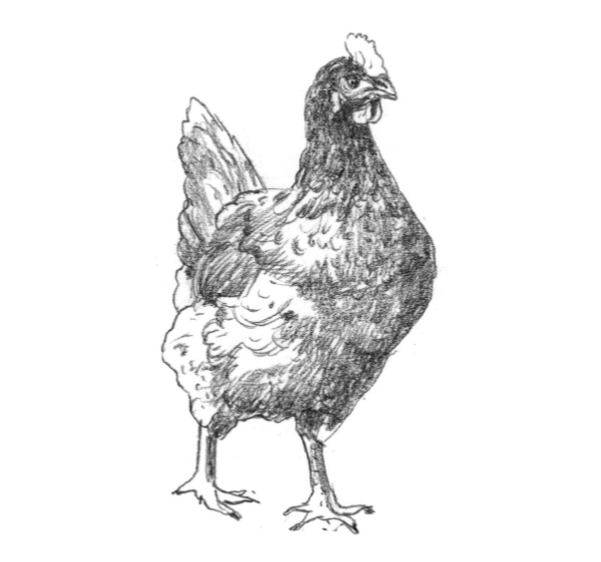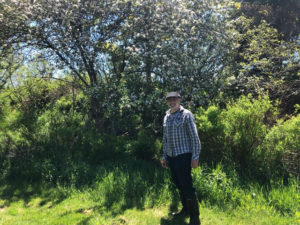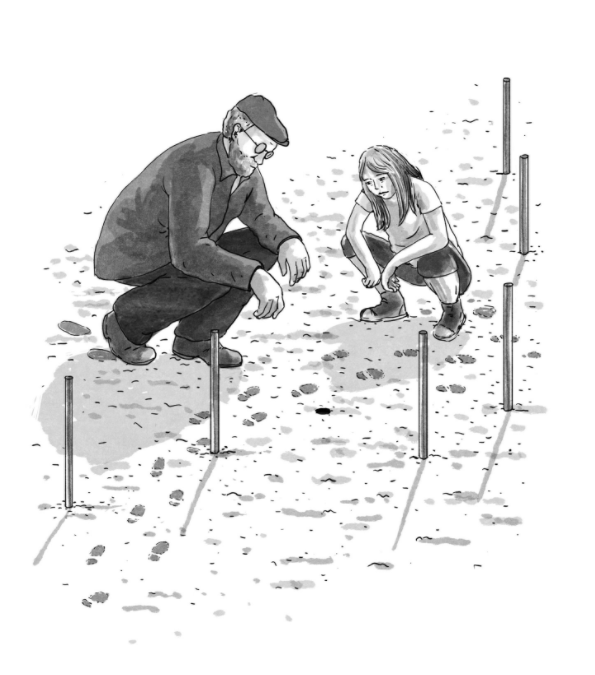Cassowaries, Chickens, and the Apocalypse: An Interview with “Morning Dew” Author Andrew McCurdy
“Life’s become pretty stable since the apocalypse. Grief’s given way to survival. Routines have been established. Farming, rationing, and scavenging skills have been perfected. Not much changes—until you unearth a mysterious black hole, growing in a field amongst the dandelions. Something about that hole is affecting nature in ways you can’t quite understand.
Discover a world where rainbow fireflies glow in tune with your mood, quantum demons swear at you from the bushes, and cassowaries roam North America.”
That’s the teaser for Morning Dew, a new novel that just released on July 27th. Andrew McCurdy’s post-apocalyptic adventure definitely gives new meaning to the word ‘novel’. He’s graciously agreed to provide some insight into what makes him and his writing tick, in what I believe is his first interview.
Lori: Now that you’re about to become a world-famous author, everyone’s going to want to know more about you. I’ll start things off with an easy question: If you had to give up either drinks or music when writing, which would you find more difficult to do without?
Andrew: Without a doubt giving up music would be much more difficult. Truthfully, I rarely drink while writing. In fact, sometimes I occupy my time with writing, while listening to music, with the intent to not just write a story but to stave off boredom that might otherwise drive me to drink. If the music selection is right for the moment, then it’s usually enough to lower my inhibitions and open up to the page.
Lori: If you could go back and tell your younger writer-self anything, what would you say?
Spend more time on your writing and less time on your hair, it will be gone in ten years, anyway.
Lori: What authors did you dislike at first, but later grew into?
This is a tough one. Usually it goes the other way where I lose interest in a writer over time. I have two that come to mind, however: James Joyce and Ursula Le Guin. In the case of James Joyce, it took me about thirty years to finish Finnegans Wake. In the past year and a half, however, I’ve read from it multiple times. I’m fascinated by its structure and the amazing language play. It helps if you are home alone and able to read it aloud. Also, my thoughts on not drinking while writing do not apply here. It’s fine to pour a stiff one and attempt to read a random passage.
Ursula Le Guin is a different case. When I was young I was given a copy of The Wizard of Earthsea, and because it didn’t fit my (then) definition of fantasy I quit reading it. Decades later, I saw a very commercial, made for TV movie based on The Wizard of Earthsea. I had never finished the book but I took issue with the whitewashing of the central character. I gave the book another shot and came to realize what I had missed in putting Ursula Le Guin aside. In the intervening years, I’ve read pretty much everything she has written.
Lori: What’s your favorite word?
Ineffable. Why? Not quite sure, it’s a wonderful word but there’s just something about it I can’t quite explain.
Lori: Can you remember an early experience when you realized that language had power?
There was no aha moment, it was an understanding that came to me over time. My maternal grandmother had a series of strokes before I was born. Though she was a very demanding, dramatic, emotional, and expressive lady, in my memory she never spoke, read, or wrote. I was told she lost not just her speech, but her language as well. As a kid I didn’t know what that meant. “How can she think if she doesn’t have language, if she doesn’t have words to think with?” I asked every grown-up who would listen. I never got a satisfactory answer and the question never went away. As an adult I work with non verbal children. Some don’t have speech, and some have neither speech nor language. I give them tools to convert images into words so that others may hear their thoughts.
If you want a specific example of the power of language, here is the strongest example I‘ve experienced. Imagine you are in a room with a young family and you give their small disabled child, silent since birth, a tablet with a series of pictures. The child looks to their mother who encourages them, by pointing and nodding, “Press something.” The child studies the tablet then presses a picture of themself, a picture of a heart, and a picture of a lady holding a baby. The tablet speaks words that this family have never heard uttered aloud: “I love you mom.” Nobody leaves that room with a dry eye.
Lori: What’s the absolute worst writing advice you’ve ever been given?
It’s ready.
Now let’s turn the conversation to your debut novel, Morning Dew. Most post-apocalypse stories fall into the horror category. And while Morning Dew has a horrifying encounter or two, you never let those situations get out of hand. In fact, possibly to your horror, I’d brand your book a Cozy Post-Apocalypse Adventure. Which leads me to ask… why? Why did you choose to write in the genre in such a gentle manner?
Andrew: I was listening to a song called Beautiful Day by the band Spafford when I opened the document to begin this novel. The first chapter’s mood is how that song makes me feel — happy to be alive. That tone you mention was intentional from the start. This isn’t my first attempt at a novel, it’s just the first I’ve completed. My previous attempts aren’t bad, but they are sprawling and unfocused, with a level of violence expected for the genre. I wanted to keep this story short, simple, and pastoral; but I also wanted elements of the fantastic and absurd, like Reba vs the cassowary, the ever present rainbow fireflies, and Schrödinger. To sum up my thoughts on this, a friend of mine in Seattle sent me a text the other day that answers this question better than I could. I’ll paraphrase her: The world could be ending, events spinning beyond your control, but hey, someone’s still got to feed the chickens.
Lori: Morning Dew is your first published novel. Was there anything you’d change about the writing experience? A lesson to carry over to your next novel?
Andrew: The actual writing is such a small part of getting a book on someone else’s shelf. It’s the publishing side that causes the stress, or at least causes me stress. Writing is free, publishing costs money, something new writers generally don’t have.
Having experienced the full process, I made a lot of mistakes I won’t repeat. I would carry these lessons forward.
For the writing: have someone else read what you are writing as soon as you are comfortable sharing, find them in your home, community or online. Accept any feedback with humility, even if you think the person giving it is full of shit. Thank those with whom you agree, or who have otherwise changed the course of your story. If you are having trouble fitting a scene into the story, don’t force it, cut it, save it, and if time shows it’s worth it, use it in something else.
For the editing/publishing: No matter how good you are you need a professional editor. Learn how to format your book, even if you don’t end up doing it yourself, at least know that you could. Don’t leave the cover to the end, finding a cover to match your vision is not easy and unless you can design it yourself, not cheap. Learn your terms, cover designers may drop you if you can’t answer basic questions about trim and bleed. If publishing on Amazon, learn all about Kindle Direct Publishing, they have online courses.
There’s probably tons more, we should save it for the next interview.
Lori: Do you hide any Easter eggs in your book that only a few people will find?
Andrew: There are enough Easter eggs to fill several baskets; I’m sure different groups will find different eggs. There are references with double meanings that only some of my friends will get but worded in such a way that it won’t negatively impact the reading experience for people not familiar with those references.
Some are easy, like songs hidden in titles, chapter headings, and names (Morning Dew, Beautiful Day, Reba, Prince Caspian, Piper); some are of medium difficulty, like song lyrics or catchphrases from old tv shows and movies. An example of this are the lyrics to “Does Anybody Really Know What Time it Is” by Chicago, hidden in character dialogue in chapter 3; and then there are some that are pretty tricky to find unless you know where to look. Good luck.
Lori: William Faulkner said, “in writing you must kill all your darlings”. Here’s your chance to bring to light any darling you edited out of Morning Dew.
Andrew: I wrote a sequence of scenes where Piper tosses a goldfish into the lake thinking it’s dead. The fish was not dead and it swims off only to return at various intervals, each time bigger, until it appears the size of a dolphin. In the end this idea didn’t make it. It was competing with the Schrödinger storyline, and I was having trouble stitching the scenes into already written chapters, so I cut the idea loose. It may swim back for another book, who knows.
Lori: Which came first – the plot, or the characters?
Andrew: The opening three pages came first, it was plot driven around the theme of the song “Morning Dew”, which is a 1960s folk song about the apocalypse. After that it was character driven, each week I would try and imagine a different challenge for the characters to face that I could then write about and bring to a small reading group I belong to.
Lori: What was the most difficult scene to write?
Andrew: The ending of The Flare Gun Incident chapter when the protagonist fully accepts that there are things in life over which we have no control—no matter how desperate our actions. It was difficult because I was thinking about an event specific to my life when I wrote it.
However, difficult passages to write are not necessarily difficult passages to read. I’m a strong believer that if you can’t make yourself laugh, cry, or smile while writing, why should you expect your reader to laugh, cry, or smile while reading.
Lori: What’s the strangest thing you had to do to create this story?
Andrew: I spent most of last winter measuring and tracking the shadow cast by a flagpole every day at noon, just so the protagonist would sound like he knew what he was talking about during the shadow nose scenes.
Enhance your reading of Morning Dew with these related links


